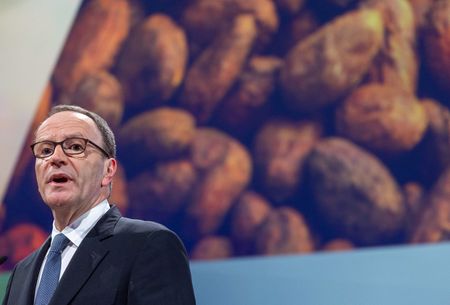By John Revill and Richa Naidu
ZURICH/LONDON (Reuters) -Nestle CEO Mark Schneider was ousted in a sudden decision by the world’s biggest foodmaker as a result of the group’s underperformance, three sources familiar with the matter told Reuters on Friday.
Nestle announced Schneider’s departure late on Thursday following a board meeting and appointed company veteran Laurent Freixe as its new CEO. This put an end to a near eight-year tenure by Schneider, a 58-year-old German, the first company outsider to lead Nestle in nearly a century.
The company declined to give further details beyond comments made on an investor call on Friday, where Chairman Paul Bulcke said the board together with Schneider had assessed the current environment and together had agreed to make the change.
Schneider did not immediately respond to Reuters’ requests for comment.
Bernstein analyst Bruno Monteyne said Schneider had made it clear recently he expected to be around for the long haul.
The suddenness of the move “is another sign that this is not a planned transition. It is clearly not his choice either, or he probably would have managed a smoother transition,” he said.
Nestle shares hit a record high in January 2022 as the group enjoyed a pandemic-driven boom, but they have been on a downward slide since May 2023 after a series of mishaps, earnings misses and guidance downgrades.
The decision to axe Schneider was reached after Nestle’s board became increasingly concerned about weak sales growth – with sales volumes increasing by just 0.1% in the first half of 2024, one of the sources said.
There were also worries about slowing product development, with new and revamped products taking longer to be devised and rolled out, with the accompanying marketing campaigns.
“The virtuous circle of introducing products, which generated cash for new products, was slowing down. That was a real concern,” the source said.
Nestle’s price-to-earnings ratio, used to gauge the relative value of a company’s stock, is 17.7, down from more than 25 in June 2022. That is higher than the consumer goods industry average of 10, but below rival Unilever’s 18.5.
The shares were down around 1.8% on Friday and were among the biggest fallers in Europe, after Freixe’s appointment, showing how investors were unsettled by the unexpected change of CEO.
UNCERTAINTY
Analysts said uncertainty about whether Nestle could reach its 2024 and 2025 targets and concerns the new CEO may reduce profit guidance as he focuses more on sales growth than margins, were among the factors weighing on the stock.
“We’ve been of the view that the current CEO has been rather seduced into doing too many deals, often chasing growth through expensive acquisitions,” said Freddie Lait, managing partner at Latitude Investment Management.
Freixe, a 62-year-old Frenchman, who has worked for Nestle for almost 40 years, is seen as a food industry insider, with a broad network of executives and experts from within and outside the Swiss group. He immediately pledged to focus Nestle on organic growth rather than acquisitions.
He is expected to increase Nestle’s focus on sales and marketing after the company trailed rivals like Danone and Unilever.
So far in 2024, Nestle’s shares have lost 10.3% of their value, trailing Danone’s 3.9% gain and lagging Unilever’s 29% increase.
Industry analysts have said Nestle has been too reliant on price increases, which have hit sales volumes as cash-strapped customers turned to cheaper brands.
BACK TO NESTLE’S ROOTS
Freixe will have his work cut out to rebuild market share and increase sales volumes in a tough market for consumer goods companies.
Still, he is used to being challenged, having led Nestle’s European business after the global financial crisis before heading the business in the Americas.
Most recently he has been head of Latin America, which has seen strong growth in recent years, with organic sales for that region growing 2.7% in the first six months of this year, ahead of the 2.1% increase for the company as a whole.
His priority as a sales and marketing expert should be to go back to the company’s roots, Jean-Philippe Bertschy, an analyst at Bank Vontobel, said, referring to the need to focus on markets, brands and on understanding its customers’ needs and behaviours.
“If you look at successful food companies lately, like Lindt and Danone among others, they all have marketing and sales people as CEO,” he said.
(Reporting by John Revill and Richa Naidu; Additional reporting by Dave Graham and Simon Jessop; Editing by Jan Harvey and Jane Merriman)





